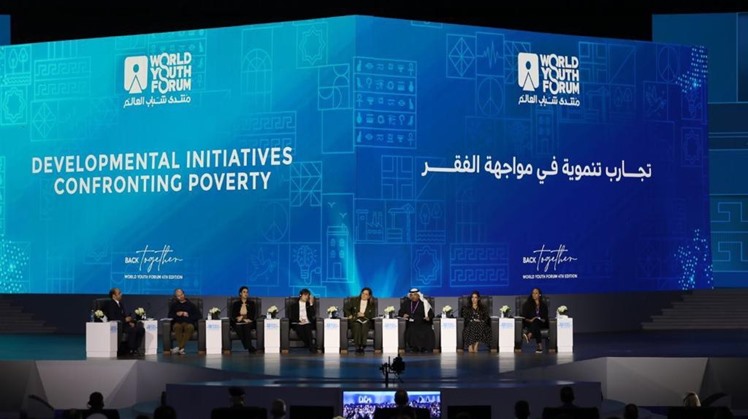CAIRO – 12 January 2022: Getting out of poverty in Africa is a hard quest given the high risks on the continent. As a result, insurance costs are high. Hence, only the rich get access to quality goods and services while the poor keep suffering. That’s not fair. "All peoples have the right to dream," Egyptian President Abdel Fatah al-Sisi showcased Wednesday stressing that conflicts in African countries have to come to an end.
The president's comments came during a panel discussion, entitled “Developmental Initiatives Confronting Poverty,” held within the World Youth Forum (WYF) in Sharm El Sheikh.
President Sisi added that “poverty causes countries and peoples to enter into mazes. Those are the mazes of destruction.”
Before the outbreak of COVID-19, the world was celebrating lifting one billion individuals out of poverty. That progress has been erased by the pandemic, Egypt’s president pointed out.
“We moved very early at the beginning of the pandemic crisis. We pledged a LE1-billion emergency plan, postponing businesses’ due dates of outstanding balances to electricity, gas, and water companies on one condition that is not laying off workers,” the president clarified.
Developmental works carried out in Egypt since 2014 are worth LE1.1 trillion, and were implemented by 4,500 firms, mostly private, President Sisi noted. He also shed light on providing fully-furnished alternative housing units to around 250,000 slum-dwelling families (almost 1 million individuals).
Poverty
UN Resident Coordinator in Egypt Elena Panova highlighted that poor people have been suffering the most during the pandemic. Debts of low-income and middle-income countries recorded the highest levels in 50 years. That is why aids are being disbursed by the United Nations but they are not enough to reduce the debt levels of those countries, Panova clarified.
Speaking of recovery, Panova said that countries have to work one three axes to attain that target. First is transforming the way economies function by focusing on manufacturing and financial inclusion. Second is sustainability, and third is inclusiveness.
In that context, the UN resident coordinator pointed out that Decent Life is effective at decreasing multifaceted poverty.
Minister of Planning and Economic Development Hala al-Said explained the changes in poverty evaluation over the years. She said it began with considering the income level, but later the quality of education, healthcare, and access to utilities, like water supply, wastewater, and transportation were added, and the term multifaceted poverty was coined.
The minister underscored that the COVID-19 pandemic is the hardest economic hit the world sustained in the modern age with 250 million individuals falling below poverty line. Said added that the crisis is worsened by the state of uncertainty about the trajectory of the virus and its variants.
Summarizing Egyptian measures in the face of the pandemic, Minister Said pointed out that on the monetary policy level, soft loans were offered and debts were rescheduled. Another axis was the emergency monetary subsidies granted to irregular workers for six months.
"On the medium-term, we focus on reducing multifaceted poverty" with Decent Life initiative - worth LE700 billion and targeting to introduce/upgrade utilities/infrastructure/facilities at 4,500 low-income villages - being the flagship program, the planning minister said.
The minister elaborated that the government works on curbing population growth as 70 percent of families composed of at least six members are trapped in poverty. Yet, she pointed out that the number of children aged below five is declining, while those enrolled in schools are rising.
Chairman and Founding Member of Decent Life Foundation Aya Omar underlined the distinct feature of the initiative, which is the unification of all developmental works in one project delivered to 58 million citizens.
President of the Arab Voluntary Union Hassan Buhazza also affirmed the positive impact of Decent Life expressing admiration for the initiative.
Solidarity
Buhazza lamented that the number of Arab volunteers is quite low, commending the UAE for allocating awards to volunteers, who also get training before starting field work.
The panel included successful examples that reflect inclusiveness. A case in point is Founder and CEO of Beam, an online platform that collects donations for the poor and homeless at the UK, Alex Stephany.
Stephany said he came up with the idea when he met a homeless man in London and wanted to help him by providing long-term solutions. He stated that 50 percent of people in need who sought the help of the platform got jobs.
Another example is Chairwoman and Founder of ECOnsult Architecture Sarah El Battouty, who said that the firm is working with the Ministry of Planning to turn rural villages into smart ones, starting with households to rationalize the use of resources like water and electricity.
An official from Prime Global also showcased how the company provides vocational training to disabled women empowering them to make a living, and/or improve their living conditions.
 Wed, Jan. 12, 2022
Wed, Jan. 12, 2022